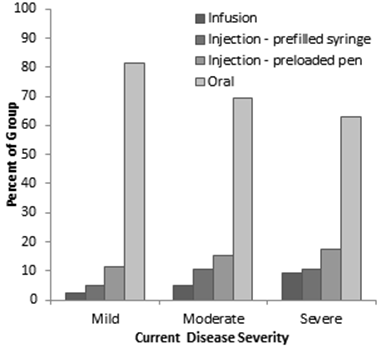Session Information
Session Type: ACR Poster Session C
Session Time: 9:00AM-11:00AM
Background/Purpose:
Medications used to manage RA vary in efficacy, safety, and convenience of use. A better understanding of patient preferences of these attributes is key to understanding patient barriers to effective therapeutic management. The objective of this study was to evaluate US patient views of RA medication attributes.Methods: The data for this analysis were obtained from the 2015 online RA community survey “Rheumatoid Arthritis in America”. The survey was administered by Health Union between August 6, 2015 and Sep. 12, 2015. Subjects self-identified as having RA and were recruited from RheumatoidArthritis.net subscribers, email and social media (N=3149). Patients aged 18 years or older at RA diagnosis, living in the US, and naïve to clinical trials (N=2735) were included in this analysis. Within the survey, patients ranked eight attributes—reduce the severity of flares, injection, infusion, proven safety record, reduce the number of flares, minimal side effects, pill, and rapid reduction of RA symptoms—assuming equal insurance and cost-effectiveness from 1 (most important) to 8 (least important). This ranking and patient preference for drug administration route were analyzed for all subjects and by age (<45, 45–64, ≥65 years old), gender, race (Caucasian, yes/no), RA disease severity (mild, moderate, and severe), and use of bDMARDs using ANOVA for continuous variables and Chi-square tests for categorical variables.
Results: Patients ranked “rapid reduction of RA symptoms” at mean (SD): 3.0 (1.8) over “minimal side effects” 3.4 (1.8); “proven safety record” 3.5 (2.0); “reduces the severity of flares” 3.5 (1.6); number of flares 3.6 (1.6); and taken as a pill 5.5 (1.9), injection 6.5 (1.7), or infusion 7.0 (1.7). For drug formulation, the majority (70%) of RA patients surveyed preferred oral medication to injection with preloaded pen (15%), injection with syringe (9%), or infusion (6%), with difference in preference by disease severity and history of bDMARD use (Figure).
Conclusion: Rapid reduction of symptoms was rated the most important attribute of RA medications, assuming equal insurance and cost-effectiveness. Oral was the preferred route of administration, with more severe (vs. less severe) and bDMARD-current (vs. bDMARD-prior/never) patients having a greater preference for non-oral. A better understanding of patient medication preference should help identify patient barriers to effective management of RA. Figure 1. Subgroup analysis of drug formulation preference by current disease severity (n=2100) and history of bDMARD use (n=2735).
To cite this abstract in AMA style:
Zhu B, Chang L, Qian L, Larmore CJ, Tanaka Y, Araujo AB. RA Medication Preferences Among U.S. Patients in an Online Rheumatoid Arthritis Community [abstract]. Arthritis Rheumatol. 2016; 68 (suppl 10). https://acrabstracts.org/abstract/ra-medication-preferences-among-u-s-patients-in-an-online-rheumatoid-arthritis-community/. Accessed .« Back to 2016 ACR/ARHP Annual Meeting
ACR Meeting Abstracts - https://acrabstracts.org/abstract/ra-medication-preferences-among-u-s-patients-in-an-online-rheumatoid-arthritis-community/


